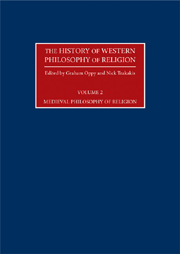Book contents
- Frontmatter
- Contents
- Editorial Introduction
- Contributors
- 1 Medieval Philosophy of Religion: An Introduction
- 2 Boethius
- 3 Johannes Scottus Eriugena
- 4 Al-Farabi
- 5 Avicenna (Ibn Sina)
- 6 Anselm of Canterbury
- 7 Al-Ghazali
- 8 Peter Abelard
- 9 Bernard of Clairvaux
- 10 Averroes (Ibn Rushd)
- 11 Moses Maimonides
- 12 Roger Bacon
- 13 Thomas Aquinas
- 14 John Duns Scotus
- 15 William Ockham
- 16 Gersonides
- 17 John Wyclif
- 18 Nicholas of Cusa
- 19 Erasmus of Rotterdam
- Chronology
- Bibliography
- Index
12 - Roger Bacon
- Frontmatter
- Contents
- Editorial Introduction
- Contributors
- 1 Medieval Philosophy of Religion: An Introduction
- 2 Boethius
- 3 Johannes Scottus Eriugena
- 4 Al-Farabi
- 5 Avicenna (Ibn Sina)
- 6 Anselm of Canterbury
- 7 Al-Ghazali
- 8 Peter Abelard
- 9 Bernard of Clairvaux
- 10 Averroes (Ibn Rushd)
- 11 Moses Maimonides
- 12 Roger Bacon
- 13 Thomas Aquinas
- 14 John Duns Scotus
- 15 William Ockham
- 16 Gersonides
- 17 John Wyclif
- 18 Nicholas of Cusa
- 19 Erasmus of Rotterdam
- Chronology
- Bibliography
- Index
Summary
Unlike his younger contemporaries, Aquinas and Bonaventure, Roger Bacon (c.1214–1292) did not write a treatise on the existence and nature of God, nor did he leave us a series of Questiones on topics related to the philosophy of religion. Moreover, he does not fit neatly into a modern ‘analytic’ understanding of philosophy of religion where the latter is often understood to be a justification of religion before the bar of argument alone. It is not that argument is lacking in Bacon's account, but that argument occupies a place that is clearly subordinate in Bacon to experience and to revelation. Bacon presents a view of a universal revelation of all knowledge beginning with the Hebrews and continued by the Greeks, Romans, Islam and Christianity that was to be common teaching until the European Enlightenment. This entails a universal revelation of all knowledge, both sacred and secular.
My account will emphasize the views of the mature Bacon (1260–92), since it is in this period that Bacon most explicitly discusses the relationship of philosophy and religion.
PHILOSOPHY AND THEOLOGY: THE HISTORICAL CONTEXT
Before presenting Bacon's account of the relation of philosophy to theology in Opus maius (Major work), part 2, I shall present the historical context outlined in part 1 of the Opus maius for Bacon's belief that philosophy as the search for wisdom must begin as a negative criticism of the impediments to knowledge. These are: submission to faulty and unworthy authority, influence of custom, popular prejudice and the concealment of one’s own ignorance by means of ostentatious rhetoric. In regard to knowledge, Bacon is no egalitarian. “ For many have been called but few are chosen for the reception of divine truth and philosophical truth as well” (Opus maius 10–11).1 He holds that the way of the gifted few (the Sapientes) in philosophy and theology is superior to methods of the vulgus philosophantium (the common herd of philosophers).
- Type
- Chapter
- Information
- The History of Western Philosophy of Religion , pp. 151 - 166Publisher: Acumen PublishingPrint publication year: 2009
- 2
- Cited by

